The War of 1885[]

Battle of Fairfax during the War of 1885
The War of 1885, fought between the United States and Quebec against the Confederacy, California, and the British and Canada lasted 24 months and resulted in the defeat of the US and Quebec. The northern goal of reunification and Manifest Destiny would ended as their armies were defeated. The war, which began in 1885, started with the American campaigns straight for Richmond in the Confederacy and Salem in Oregon. However, the better generals and soldiers of the invaded nations quickly turned the tide of the war, while the Royal Navy blockaded the coast and decimated the United States economy. Canadian soldiers poured into western Quebec while the Confederates drived for Washington. Though the Confederates would be stopped at Annapolis, a Confederate victory was clear and Union president James G. Blaine called for a ceasefire in 1887.
Consequences of the War[]
The war, referred to by many in the south as the "Second War of Independence", showed that the reunification was not possible. The Confederacy proved it was equal to the north and was its own independent nation. In the north, spirits were shattered and the economy slumped. Blaine and the Republican Party lost all credibility following the war, and would never win another election and would disband in the 1890s. Nationalist party candidate Grover Cleveland would win a landslide election 1888, and promised to continue to industrialize the nation and revive the economy. Similiarily, Parti Rouge in Quebec would be blamed for the defeat and fall out of power, and be replaced by the Socialist Party half a decade later.
The Confederacy and California proved the were forever free, and continued to expand the railroads and telegrams that connected them. In the Confederacy, the former slaves were further integrated in the nation, especially in the army, where all-black military units were created that fought on the western front. In the north, the British dominion of Canada continued their expansion into Quebec, taking large swaths of land from the western half of the nation.
The war could be seen as a smaller version of World War I which would erupt in 1912. Trench warfare dominated the Virginian front and slowed the Union advance, while weapons like the machine gun debuted. The combination of this technique and weapon could cause thousands of casualties for little gains. The major European powers ignored these lessons, while some of the smaller nations adapted these policies in order to level the playing field in future wars.
Industrialization[]
In the second half of the 1800s, the world entered a new period of imperialism and industrialization. The massive empires of Europe possessed far flung colonies around the world, and new ideas and products spread across the earth faster than ever before. New techniques of gaining fuel from coal and producing steel changed transportation and construction; coal powered locomotives that traveled on steel tracks across continents. Miles upon miles of track were laid in nations, especially in France, which had discovered the need for fast transportation following its defeat in the Franco-Prussian War. The United States and Quebec built the Montreal-Washington Railroad, in order to transport troops and goods faster. The first railroad to travel from one seaboard to the other, the Confederate-California, would be completed in this time as well. Construction began on the "Continental Railroad" which would be the largest in history, linking Berlin to Baghdad to Cairo to the Cape of Africa. Steel was also used in the construction of taller buildings in the major industrial cities of the world, and some began to realize steel's usage in construction better weaponry and artillery.
The economy grew faster than ever before. Nations became linked by the telegram and colonies grew closer to the motherland by increasing trade using powerful steam-engine ships. Living standards improved as productivity increased and prices fell. Some workers found themselves unemployed, having been replaced with machines, and along with lower prices, often caused economic depressions. The workers of the world found themselves either enjoying unprecedented growth or a crushing depression. In 1900, the industrial leaders of the world were Britain, the United States, Germany, France, and Russia, with other nations struggling to catch up.
The Rights of Workers[]
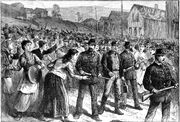
Pinkerton detectives breaking up a strike in Pennsylvania
Workers powered the mighty industrial empires of the time. However, it was costly; these workers were poor and had poor living conditions, worked for low wages, and worked in dirty dark factory conditions. In order to combat this, workers attempted to unionize, with the goal of increasing wages, decreasing working hours, and improving working conditions. When their employers refused to negotiate, these workers went on strike, which often ended in bloodshed. Strikes such as one in the factories of Marseilles, Liverpool, and Moscow shut down services and led to violence. The most notable is the "Battle of Lowell" in Massachusetts where, for five days, striking mill workers and the Pinkerton mercenaries brought in to break up the strike clashed, resulted in the death of over 300 and the Army being brought in.
Other strikes such as the Pullman Strike shut down much of the western United States' rail and mail service, resulting in President Grover Cleveland sending in the Army and National Guard. As a result of these strikes the government would support the industrialists and big business over the workers, hindering the progress of the unionists.
Japanese Imperialism[]
The Empire of Japan, having been opened up to the world by the British, was now the strongest Asian power, with its massive industrialized armies and navies eager to prove their might. Japanese armies had already defeated the outdated Chinese military to take over the Korean peninsula in 1894, and now they hoped to flex their muscles by taking on a much stronger European opponent to prove the Europeans that Japan was just as strong. Eyeing the lightly defended Spanish colonies, especially the Philippines. In September of 1898 the Japanese launched a surprise assault on Manila, raising the Rising Sun flag above the city in a few days. Obsolete squadrons of the Spanish fleets that defended the colonies were easily destroyed, and a second Japanese amphibious assault took Guam. With the Spanish Empire reeling, the Confederacy took the opportunity to force the Spanish into handing over Cuba. With the navies defeated and armies humbled, the Spanish surrendered after 10 weeks, the first time a European power had been defeated by an Asian nation.
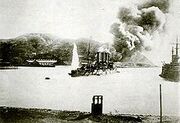
Bombardment of Port Arthur in the Russo-Japanese War
Meanwhile, tensions were brewing between the Russians and Japanese over Manchuria and Korea, which both believed was rightfully theirs. Seeing how easily the Japanese thrashed the Spanish, the Russians attempted to take the Japanese seriously, but as the years passed and Russia tightened control over Manchuria, they were pulled in a sense of security, which made the Japanese assault on Port Arthur in 1903 that much more shocking. The Russian Pacific Fleet was quickly destroyed by the Imperial Navy, and weeks later the Japanese took victory in the Battle of Vladivostok. The Russian Atlantic Navy, forced to travel around Africa due to being denied access by the British to the Suez Canal, arrived in the Pacific only to be obliterated by the Japanese navy. Russia and Japan would sign the British-organized Treaty of Liverpool, which forced Russia to give up parts of Sakhalin Island. Russian influence in Manchuria was becoming replaced by the Rising Sun, which would annex Korea in 1910.
The "American Dream"[]
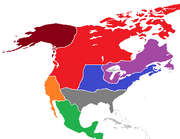
North America, 1890
Following the end of the war, the American economy boomed following the election of Nationalist president Grover Cleveland in 1888. Cleveland focused on industrializing the nation, and fueled by massive European immigration, many new factories, mines, railroads, telegrams, and schools were built across the nation. The "Gilded Age" would be powered by the new immigrants as the population of the nation soared to over 54 million and still increasing.
The ethos of the United States were established at this point, the American Dream, and the importantance of patriotism. The American Dream is a set of ideals in the people of America, through hardwork, can prosper and be successful and advance upward in society regardless of race or their social status at birth. Patriotism and nationalism was encouraged and expected of every citizen, to never forget the losses suffered in the previous two wars, and to make sure to never lose again. The size of the military increased under President Theodore Roosevelt, with the goal of avenging their loss to the Confederacy.
Yukon Gold Rush[]
Gold was discovered in Yukon Territory in 1892 of Alyeska, thus beginning the "The Last Great Gold Rush". Over a hundred thousand hopeful prospectors to the northern nation. The nation's wealth grew as many of these new settlers would never return home. Those who could not find gold were employed to build infrastructure. Hundreds of new factories, buildings, and mines were built during this time, while railroads and telegrams connected the various coastal cities and trading posts connected the interior.
Alyeska became on of the most diverse nations on the planet as thousands from Latin America, Europe, and Asia flocked to it. Many of these new immigrants would find jobs in the newly-constructed factories built in Sitka and Anchorage. All of this industry led to the rise big names like Jefferson "Soapy" Smith, who had a monopoly over steel in the nation. Later Prime Ministers would attempt to break up monopolies but big business still held power over the workers, who attempted to form unions, though few would be successful.
Roosevelt's Liberals[]
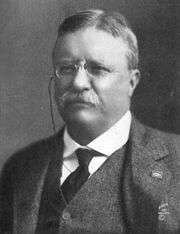
American President Theodore Roosevelt
Horrified by the conditions of workers and the bloodshed between them and the Pinkertons led to the creation of the Liberal Party in 1892. Many people of the progressive movement and unionists would flock to the Liberal banner, and the short Panic of 1893 would attract enough members to ensure its presidential candidate, William McKinley, would ascend to the presidency in 1894. On the more extremist side, there were the anarchists, who believed violence was the only way to get workers the rights they deserve.
McKinley would work to protect manufacturers and factory workers from foreign competition and improving factory conditions, but his work would come to an end during his second term. While visiting the Temple of Music in Buffalo, New York, McKinley would be fatally wounded by anarchist Leon Czolgosz. McKinley would die of his wounds 8 days later, while the assassin would executed by electric chair. The assassination would lead to the Secret Service being charged with the responsibility for protecting the president and Theodore Roosevelt coming to power.
Roosevelt, an officer during the War of 1885, focused on "prosperity at home and abroad". He created antitrust laws and broke up the monopolies held by Carnegie and Rockefeller, and attempting to improve the living standards and rights of workers. Roosevelt would also modernize the army, arming it with new weaponry, as well as updating the navy, which was sent on a world tour to show American power. Roosevelt was certain a war with the Confederacy was on the horizon, and wanted the Union to be prepared.
The Atlantic Doctrine[]
With America focused on settling accounts in North America, the rest of the New World was open to European influence once again. With France establishing a puppet state in Mexico, Britain hoped to prevent further European colonization. The "Atlantic Doctrine" was issued, which was pretty much the same as the American Monroe Doctrine. The British planned on using their powerful navy to back up their doctrine, but with so many colonies spread out across the world, there was always going to be gaps. The French arrived in Colombia in 1881 in order to build a canal in the isthmus of Panama. The project was plagued with problems, from rusting equipment to disease. There was also internal unrest in Colombia, resulting in a short rebellion in 1885. The Liberal Party wished to remove the French and other foreigners from Colombia, while the French found an ally in the form of decorated Conservative general Rafael Reyes. In 1887, civil war broke out in Colombia between the Liberals and the Conservatives following a constitutional crisis. The French backed the Conservatives, specificly General Reyes, and after 3 years, the Liberals were defeated. In 1890 with French backing, Reyes would be elected president. The French had established another ally in the New World.
British Brazil[]
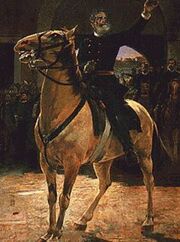
The Brazilian Proclamation of the overthrow of the monarchy, replaced with a republic
Britain would begin its own imperialist conquests in South America, a continent full of unstable nations rife with corruption. Instability in Brazil began around this time with the death of Emperor Pedro II. Britain funneled weapons and advisors to the Brazilian Army, who in 1889 overthrew the monarchy and established a republic led by Marshal Deodoro da Fonseca. The rapidbly modernizing army became the most powerful force in Brazil, constantly supported with British supplies and wealth. With the powerful Brazilian oligarchies supporting the new British-backed government, little could be done to remove the British from power. Britain pumped money into Brazil's infrastructure as well, and tensions began to brew on the northern border with French Colombia.
The World Divided[]
As the 19th century came to a close, the Great Powers raced to colonize the world and gain its resources and riches. The two main competitors, Britain and France, were still carving up South America, with the French propping up a new government in Argentina.
Nationalism and Social Darwism[]
Arms Race[]
The Balkans Crisis[]
| |||||||||||||

